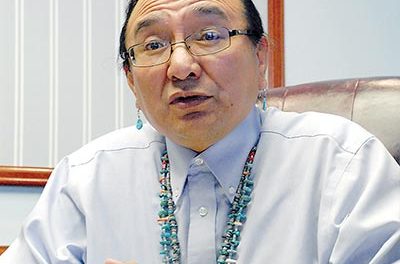
Report: Proposed copper mine threatens groundwater supply
SAN CARLOS, Ariz.
The proposed construction of the Resolution Copper Mine would consume hundreds of billions of gallons of groundwater, hydrogeologist James Wells, Ph.D., concludes in a report released Sept. 28.
At the same time, Arizona faces surface water supply reductions worsened by climate change.
“If the Resolution Copper Mine is approved, it will commandeer a vast amount of the state’s water, leaving less for everyone else,” Wells said in his report, “The Proposed Resolution Copper Mine and Arizona’s Water Future.”
The mine, proposed for construction in the Pinal Mountains 60 miles east of Phoenix, would consume enough water to supply a city of 140,000 people every year for 40 years, Wells states.
“Should mining be getting more water while other water users are forced to cut back?” Wells asks. “This is a tough and urgent question that Arizonans must face in light of impending water shortages.”
Resolution’s groundwater withdrawal would be at the same time federal water managers last month slashed Arizona’s share of the Colorado River by 500,000-acre-feet.
The initial cutback primarily impacts farmers but future reductions “will hit urban areas as well, with water restrictions and higher prices virtually inevitable,” Wells said.
The report was commissioned by the San Carlos Apache Tribe.
San Carlos Apache Chairman, Terry Rambler, said Wells’ report shows conclusively the mine should not be built.
“The Resolution Mine poses a grave and unacceptable impact to Arizona’s declining and finite groundwater supplies while surface water supplies are being reduced,” Rambler said. “This mine must not be constructed.”
Wells said, “The mine will use 775,000 acre-feet of water over the life of the mine, of which 70% will be pumped from a large network of new extraction wells in the East Salt River Valley. That’s 250 billion gallons of water.”
Rio Tinto and BHP, two of the world’s largest, foreign-based mining companies, are poised to begin construction of the Resolution Mine in the mountains between Superior and Globe.
Construction of the mine hinges on a pending land exchange that would transfer ownership of 2,422 acres of Tonto National Forest to Resolution.
The land includes Oak Flat, which Western Apaches and other southwestern tribes consider sacred and a fundamental part of traditional religious practice.
Oak Flat, also known as Chí’chil Biłdagoteel, is listed on the National Register of historic places as a traditional cultural property.
Resolution’s underground mine would cause Oak Flat to collapse into a mile-wide, 1,000-foot-deep crater.
The Wells report was funded by a grant from The Mica Group with support from the William and Flora Hewlett Foundation.







 Highway 264,
Highway 264, I-40, WB @ Winslow
I-40, WB @ Winslow